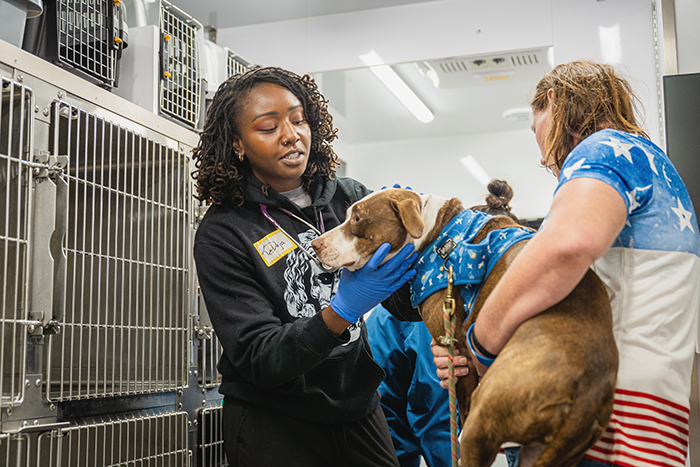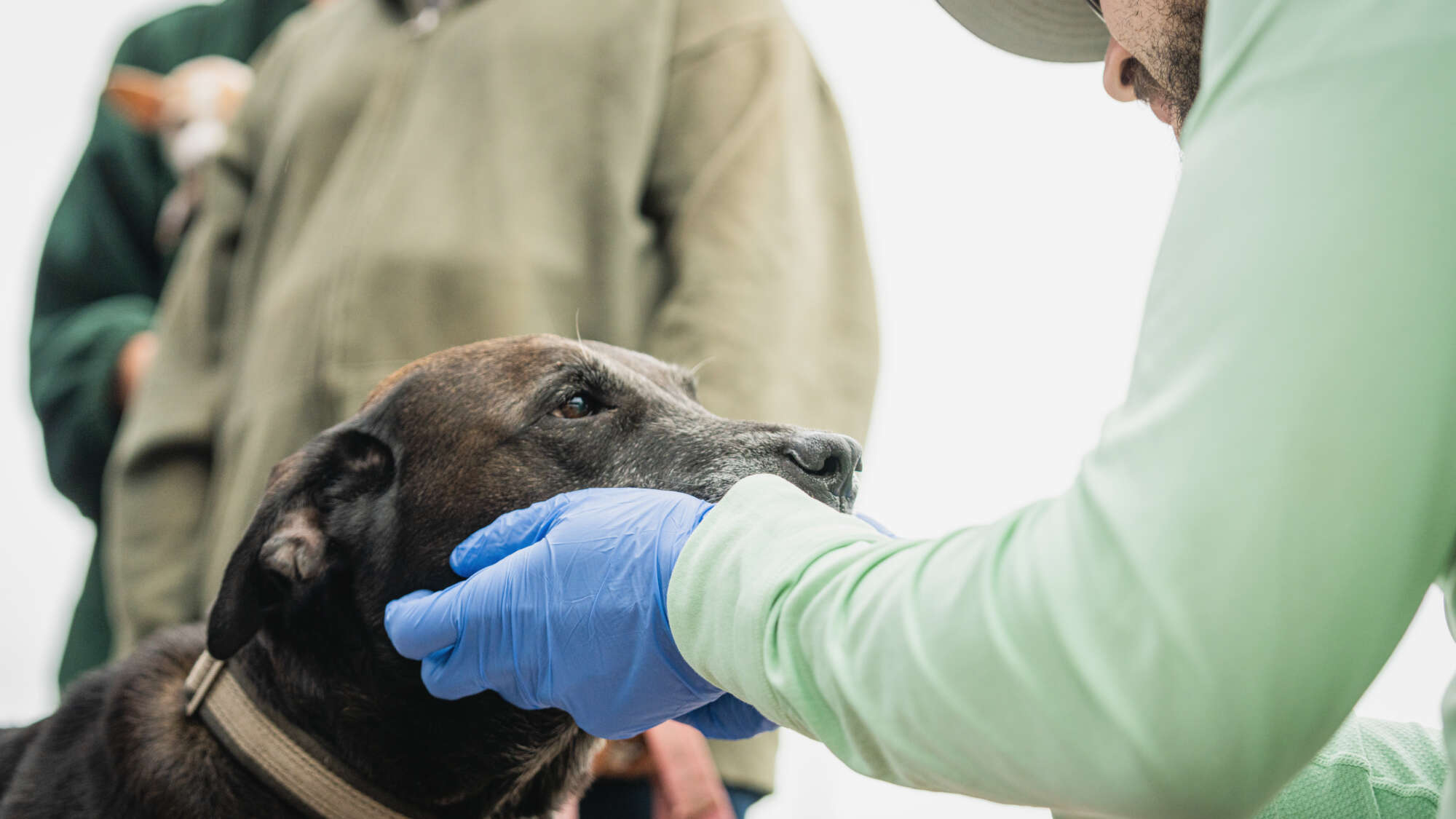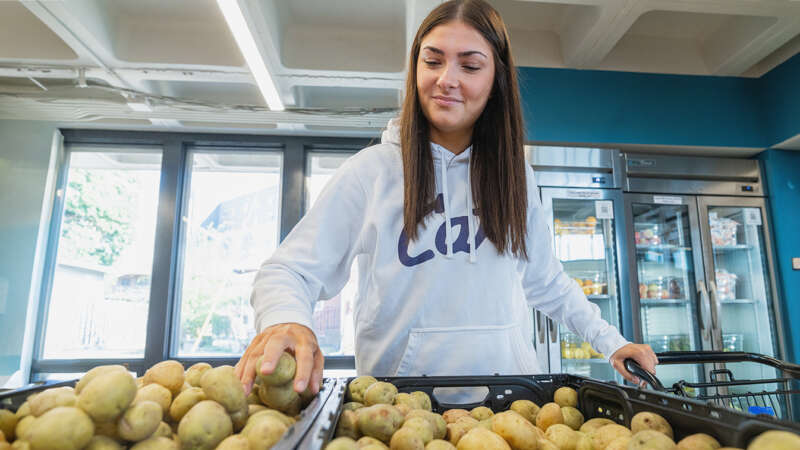K-State’s Wellness on Wheels brings veterinary care to vulnerable populations
“She’s my life,” Randy Roberson said as a lone tear rolled down his cheek.
Roberson calls a campsite along the river in Topeka home, even on cold fall days. He’s concerned about his beloved lab-mix pooch, Little Sister, who was jumped by another dog last night. Her usual confidence is hiding behind anxious eyes.
Roberson brought Little Sister to be seen by veterinarians and veterinary students from Kansas State University and The Street Dog Coalition. The vets, along with Valeo Behavioral Health Care, Stormont Vail Health, the Topeka Police Department and Topeka Rescue Mission Ministries make up the Mobile Access Partnership, or MAP, which provides outreach and services to people who are living on the street or don’t have housing of their own.
In the three-and-a-half years he and Little Sister have been together, Roberson revealed to me they’ve only been apart once. For eight hours.
“She goes everywhere with me,” he said. “She brings me comfort and safety. She’s always watching my back, and I watch hers.”
The leash as a lifeline
Riding in K-State’s Wellness on Wheels mobile veterinary vehicle on our way to Topeka, Dr. Ron Orchard, who teaches community outreach, explained that by helping pets, veterinarians are also a conduit to care for people. It’s a matter of building trust and taking care of the lives at both ends of the leash.
We’re on our way to a weekly MAP outreach event to provide people without housing with food, a shower, clean clothes and medical care. People receive help with getting IDs, housing and work. And if they have pets, they can have their companions taken care of.
“What the veterinarians are doing is opening doors for us to reach some of the people who would not necessarily open their camp to us,” said Jenny Falk, director of MAP operations for Topeka Rescue Mission Ministries. “That initial touchpoint of having their pet taken care of has allowed us to start building relationships with some folks to the point where they come on their own now.”
Unbreakable bonds
Over and over, MAP workers and volunteers told me that these owners love their pets more than themselves — and will do anything for them. On this cold, windy day, that was evident everywhere you looked.

Renee Adams took off her tan hoodie and wrapped her puppy, Star, in it. A chihuahua, Miss Piggy, stayed warm inside Charles VanVleck’s green fleece. Everyone who brought a pet waited out in the cold to make sure their companions could get the preventive care, or sometimes emergency care, they needed.
Why do people struggling with homelessness go to such lengths to keep and care for their pets when they’re having difficulty taking care of their own needs?
“Before, I wondered about that. Then I walked a mile in their shoes and saw the error in that thinking,” said Matt Baldwin, homeless case manager with Valeo Behavioral Health Care. “A lot of people have trauma in their life. And those dogs are the only thing that loves them unconditionally, the only thing they can trust. Their pets are a constant companion, give them a reason to get up in the morning and keep them moving forward.”
Sylvia Ramos feels that way about Loki, her fluffy black shepherd. When I asked her what having Loki in her life meant to her, she replied, “Unconditional love. He loves me no matter my good days or bad days. He’s my anxiety tamer,” she said. “One time I was having a panic attack and he curled up right behind my neck on the arm of the couch, and I was instantly calm and relaxed.”
It’s because of this human-animal bond that MAP is able to help people experiencing homelessness.
“One of my favorite quotes says, ‘Recovery happens at the speed of trust’,” Baldwin said. “People love their fur babies more than themselves and more than most other humans. So they’re much more likely to go above and beyond to get the pet’s needs taken care of. This then helps them start working toward getting their own needs taken care of.”
Wellness on wheels
In K-State’s Wellness on Wheels (WOW) vehicle, fourth-year veterinary students bring care to pets that will never visit a veterinarian otherwise due to cost, location or a lack of information about basic pet care. This could be individuals who are elderly, experiencing homelessness, living in a remote location or people with serious illnesses.
WOW and its services are made possible through gifts from Cheryl Mellenthin of Sealy, Texas, and many other individual and corporate donors, as well as through grants. The WOW vehicle was added to K-State’s shelter medicine and community outreach program in 2021. It joined the mobile surgery unit, which partners with animal shelters and rescue groups to provide spay and neuter services, as one more way to give veterinary students surgery experience.
“The WOW is set up with many of the features of a general practice veterinarian and includes exam areas, a surgical suite, dentistry equipment, digital radiography and seating for clients as we consult with them,” Orchard said. “The goals for the community outreach course include training students to practice resource-limited medicine, while working with clientele who historically would lack the ability to have their pet seen by a veterinarian. We hope to instill in every student that every client is worthy of a veterinarian-client/patient relationship.”
Real-world preparation
Dr. Allison Crow, a K-State graduate, discovered her calling when Baldwin invited her to join him on a visit to a family living by the river. Their dog had recently had 10 puppies.
“That experience showed me the power of the human-animal bond,” Crow said. “People who had very little poured their resources and their ingenuity into making sure those animals were cared for.”
The family had MacGyvered a heating system for their shelter and nested the puppies just the right distance from the heat source to keep them warm, but not too warm.
Crow, who works in a veterinary clinic in north Topeka, continued to go on visits with Baldwin. Then the pandemic lockdown hit in March. As things began opening up again later that year, Crow looked into grants to fund her work with the unhoused and launched the Topeka chapter of The Street Dog Coalition. Orchard reached out to her and the partnership between Street Dog and K-State was born.
“I love having students come experience the spectrums of care and be able to put theory into clinical practice before they graduate,” Crow said. “Even when people are not homeless, a great majority of them have issues with the financial burden of pet care. So having this perspective and being forced to think about how to offer various options and levels of care is helpful for the students, and it has made my experience in clinical practice much better as well.”




